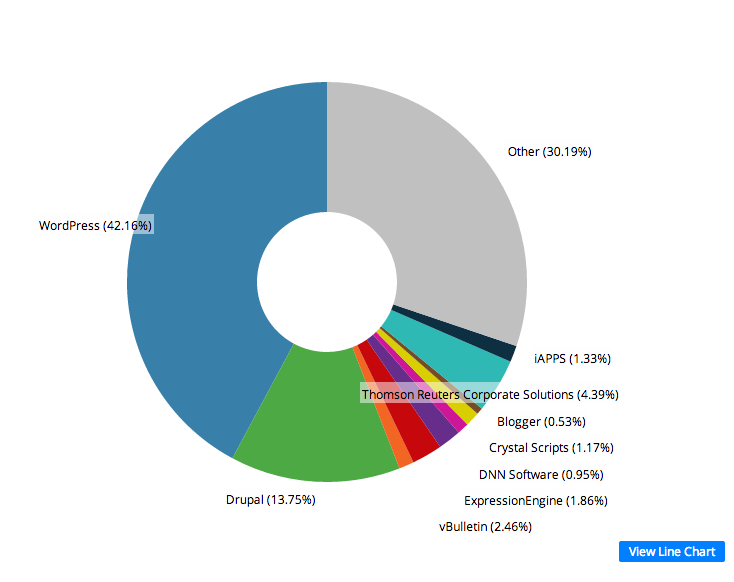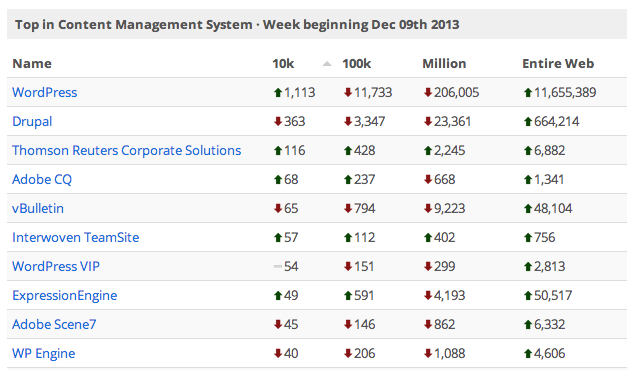First off, Drupal has had a great year in 2013 and a great quarter. According to builtwith.com Drupal is second among all Content Management Systems at 13.75% of the top 10K websites and has added ~250K new website this quarter. That said, the number one CMS (WordPress) is at 42% of the market and according to the same source has added 5MM (yes, 5 million) websites this quarter. Here's the graph:

But, you say, Drupal is more extensible and is a better fit for enterprise engagements. It has to be winning in adoption when you look at larger websites, right? This gets tricky to determine, since the measure of "large" is based on traffic, and some of the most high traffic websites can be blogs. But let's assume that we can use the top 10K, 100K and 1MM websites measured by traffic to gauge "enterpriseness". Here's that chart:

Again, WordPress appears to be dominating, while Drupal usage in these top tiers is actually retreating. So why? I believe the answer to this question has three major facets:
- Economics
- Scarcity
- Familiarity
Economics
As Doug Vann, Drupal Consultant, has said "demand for Drupal developers is really crazy right now". Combine that demand with the relatively long time it takes to get ramped up as a Drupal developer (let's say ~2 years) and you have a market that is being squeezed. This is driving prices/rates for developers up, which in turn, drives the cost of Drupal website building up. The net effect is that Drupal websites cost more than WordPress sites, especially for enterprise customers that may be looking at TCO. No judgement here on whether the ROI is there or not - simply that Drupal sites cost more.
Scarcity
Costs aside, Drupal developers and shops (remember the ramp up time) are simply harder to find than WordPress developers. This has an impact for any projects that may have specific timeline requirements or where people are concerned about vendor availability.
Familiarity
Possibly the biggest issue that Drupal faces is one of unfamiliarity with key decision makers. WordPress owns the blogging space, which I would describe as the gateway drug to content management. This is particularly true in marketing, where many CMOs first experience with in-browser content editing is WordPress. The experience is streamlined and well-groomed, vs. the relatively clunky Out-Of-The-Box experience one gets with stock Drupal. Since the vast majority of website spending is managed by a company's marketing department this familiarity with WordPress makes it a front-of-mind choice.
My Two Cents
In many cases website purchases are not made keeping the full cost of maintenance and security in mind. When these things are considered, a different level of experience and quality is required from the vendor delivering the website, regardless of the platform (WordPress, Drupal, etc.) and the costs and relatively scarcity of developers are likely to be very similar. Fundamentally there are only a small group of people capable of building large-scale website and they generally charge a premium for their services. For a buyer with other priorities (campaign success, product visibility, etc.) it may be difficult to qualify vendors on quality so the surface metrics 1) hourly rate and 2) pool of available vendors are big influencers.
Bottom-line because of the complexity involved in technology, it's important to evaluate every project on the basis of the short and long term goals and make the best decision on platform on this basis. Whether using WordPress or Drupal (or Python/Django, Angular.js, etc.) it's always a good idea to make an educated decision.